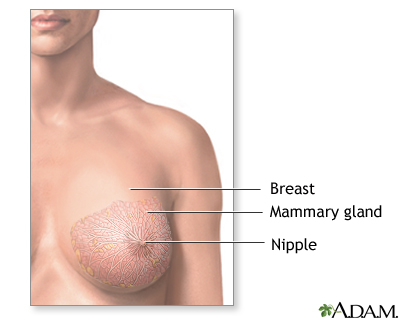Health Topics
A breast infection is an infection in the tissue of the breast.

Causes
Breast infections are usually caused by common bacteria (Staphylococcus aureus) found on normal skin. The bacteria enter through a break or crack in the skin, usually on the nipple.
The infection takes place in the fatty tissue of the breast and causes swelling. This swelling pushes on the milk ducts. The result is pain and lumps in the infected breast.
Breast infections usually occur in women who are breastfeeding. Breast infections or inflammation that are not related to breastfeeding might be due to a rare form of breast cancer.
Symptoms
Symptoms of a breast infection may include:
- Breast enlargement or fullness on one side only
- Breast lump
- Breast pain
- Fever and flu-like symptoms, including nausea and vomiting
- Itching
- Nipple discharge (may contain pus)
- Swelling, tenderness, and warmth in breast tissue
- Skin redness, most often in wedge shape
- Tender or enlarged lymph nodes in armpit on the same side

Exams and Tests
Your health care provider will perform a physical exam to check for complications such as a swollen, pus-filled lump (abscess). Sometimes an ultrasound is done to check for an abscess.
For infections that keep returning, fluid from the nipple may be cultured. In women who are not breastfeeding, tests done may include:

Treatment
Self-care may include applying moist heat to the infected breast tissue for 15 to 20 minutes four times a day. You may also need to take pain relievers.
Antibiotics are very effective in treating a breast infection. If you take antibiotics, you must continue to breastfeed or pump to relieve breast swelling from milk production.
If there is an abscess that does not go away, needle aspiration under ultrasound guidance is done, along with antibiotics. If this method fails to cure the abscess, then incision and drainage is the treatment of choice.
Outlook (Prognosis)
The condition usually clears quickly with antibiotic therapy.
Possible Complications
In severe infections, an abscess may develop. Abscesses need to be drained, either as an office procedure or with surgery. A wound dressing would be needed to help with healing after the procedure. Women with an abscess may be told to temporarily stop breastfeeding.
When to Contact a Medical Professional
Contact your provider if:
- Any portion of your breast tissue becomes reddened, tender, swollen, or hot
- You are breastfeeding and develop a high fever
- The lymph nodes in your armpit become tender or swollen
Prevention
The following may help reduce the risk of breast infections:
- Careful nipple care to prevent irritation and cracking
- Feeding often and pumping milk to prevent the breast from getting swollen (engorged)
- Proper breastfeeding technique with good latching by the baby
- Weaning slowly, over several weeks, rather than quickly stopping breastfeeding
- Timely treatment of a breast infection before it progresses to a breast abscess
Alternative Names
Mastitis; Infection - breast tissue; Breast abscess - post partum mastitis; Breastfeeding - mastitis
References
Dabbs DJ. Metaplastic breast carcinoma. In: Dabbs DJ, ed. Breast Pathology. 3rd ed. Philadelphia, PA: Elsevier; 2024:chap 25.
Dinulos JGH. Bacterial infections. In: Dinulos JGH, ed. Habif's Clinical Dermatology. 7th ed. Philadelphia, PA: Elsevier; 2021:chap 9.
Klimberg VS, Hunt KK. Diseases of the breast. In: Townsend CM Jr, Beauchamp RD, Evers BM, Mattox KL, eds. Sabiston Textbook of Surgery. 21st ed. St Louis, MO: Elsevier; 2022:chap 35.
Mohsin SK, Dabbs DJ. Infections of the breast. In: Dabbs DJ, ed. Breast Pathology. 3rd ed. Philadelphia, PA: Elsevier; 2024:chap 3.
Woods CR. Subcutaneous tissue infections and abscesses. In: Long SS, ed. Principles and Practice of Pediatric Infectious Diseases. 6th ed. Philadelphia, PA: Elsevier; 2023:chap 73.
Review Date 10/17/2024
Updated by: Linda J. Vorvick, MD, Clinical Professor, Department of Family Medicine, UW Medicine, School of Medicine, University of Washington, Seattle, WA. Also reviewed by David C. Dugdale, MD, Medical Director, Brenda Conaway, Editorial Director, and the A.D.A.M. Editorial team.







